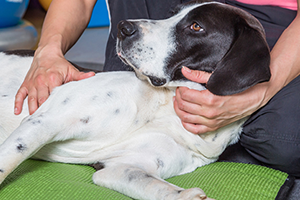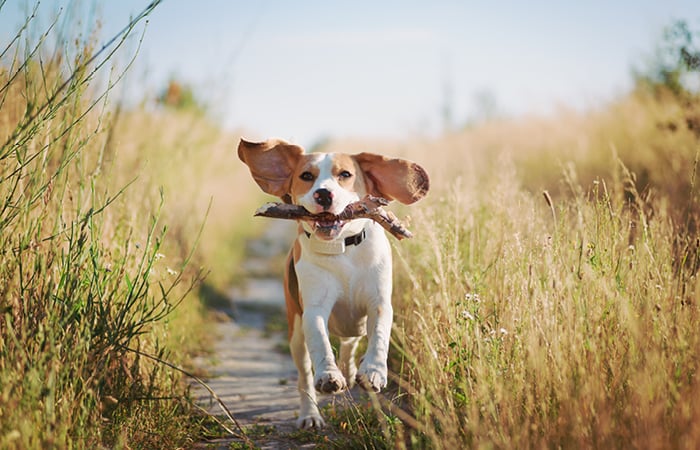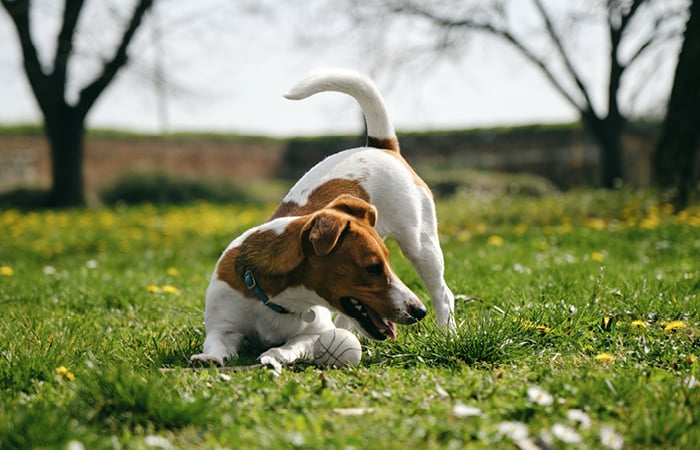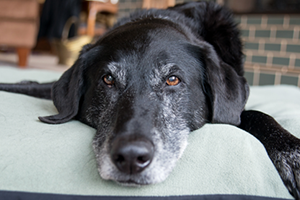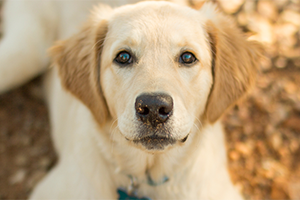
Dalmatian
Vital stats
Swipe to view more
| Size: | Medium to large |
| Coat: | Short, requires weekly grooming |
| Exercise | 2+ hours daily |
| Life span: | 11 – 13 years |
| Breed group: | Utility |
| Temperament: | Intelligent, sociable, senstive |
Dalmatian temperament & personality

- Dalmatians can be affectionate and outgoing with their families, but tend to be reserved and slightly aloof with strangers.
- This breed is sensitive and lovable but needs consistent training to become the perfect pet.
- The Dalmatians’ history as a coach dog means they have boundless energy – they need at least two hours of physical exercise per day.
- The only breed known for smiling – you might see the famous ‘Dalmatian smile’, when this breed curls their top lip upwards and shows their teeth, which can be to show respect, to convey excitement or to appease their owners.
- Dalmatians have a happy, playful nature that makes them an excellent choice for families with experience of owning energetic, intelligent dogs.
Dalmatian training & exercise

Training tips
- Dalmatians are playful and excitable. To keep their energetic character in check, they need a lot of training from a young age.
- As a sensitive and intelligent breed, positive reinforcement training techniques work best for Dalmatians.
- Dalmatians can be reserved with strangers, so socialisation from a young age is essential. This ensures your dog can cope with a wide range of social situations, including interacting with different people and dogs.
- Mental stimulation is just as important for Dalmatians as physical exercise. Owners need to provide plenty of opportunities for their dogs to stay happy, entertained and engaged.
Keeping them happy
- Without enough physical or mental stimulation, Dalmatians can become bored. This may result in them finding ways to keep themselves occupied, which may result in destructive behaviour like chewing, jumping up or excessive barking.
- Dalmatians often get an unfair reputation for being unruly or hyperactive – but this is rarely the case for dogs that receive enough exercise and training.
Exercise
- Dalmatians love long runs and plenty of exercise every day – potential owners need to think carefully if they can provide for the above-average exercise requirements this breed demands.
- Dalmatians tend to love long hikes, sniff walks, and agility – anything that keeps their mind and body active.
- Dalmatians are a fastidious breed and don’t tend to enjoy water. Some will even avoid puddles.
Game ideas
- Dalmatians love games! Try teaching them to play hide-and-seek, set up an indoor treasure hunt or choose some stimulating dog games and puzzles.
- Puzzle toys are a great way to extend feed times, stave off boredom and challenge your Dalmatian to work for their food.
Dalmatian grooming

Easily identifiable by their spots, Dalmatians have short, low-maintenance coats – but a weekly brush is needed to keep them in great condition.
- The natural oils in a Dalmatian’s coat tend to keep their spots shiny and prevent their skin from drying out.
- As an adult, this breed sheds profusely twice a year. At these times, more frequent brushing is needed to keep loose hairs under control.
- Dalmatians don’t tend to need baths too often – aim for once a month at the most. Owners often report a distinct lack of ‘doggy’ odour!
- Born with an all-white coat, Dalmatian puppies only develop their trademark spots at around two to three weeks old. Their spots can be black or liver-coloured.
Dalmatian nutrition

As with most dog breeds, Dalmatians need a balanced diet that follows a consistent routine.
- Dalmatians enjoy their food and typically do very well on a normal, well-balanced diet.
- The amount of food your Dalmatian requires will depend on their activity levels. To maintain their body condition, very active Dalmatians may need more food than other breeds of a similar size. Less active Dalmatians may put weight on very easily and need smaller meals. Check your dog’s body condition regularly and adjust their diet as needed.
- Treats can be a useful training aid, especially as Dalmatians are often very food-motivated. Make sure to account for the calories within treats when calculating your dog’s meals.
What to know before you buy or rehome a Dalmatian

A Dalmatian dog will make the perfect partner for the right owner. If you’re thinking about getting a Dalmatian, here are a few important things to consider.
- If buying a puppy, always do your research. Lucy’s Law means that third-party sellers (like pet shops) are not allowed. Puppies can only be bought directly from a reputable breeder or adopted from a rescue centre.
- Before committing to dog ownership, there are a lot of things to consider. Make sure to choose a breed that’s suited to your lifestyle, and that you can provide the care they need to thrive.
- Dalmatians can be prone to some health issues including kidney stones. Make sure your breeder shares the results of the breed-specific recommended health tests.
- Inherited deafness also affects the breed, with 10 to 12% of Dalmatian puppies being born deaf. Health tests should confirm whether puppies can hear in both ears, one ear, or neither ear.
Dalmatian frequently asked questions
Discover some of the most popular dog breeds
Dalmatian insurance considerations
We always offer these things as standard:
Physiotherapy & pet therapies
Along with physiotherapy, which is covered within the Vet Bills benefit, we also cover Pet Therapies like herbal medicine, homeopathy and acupuncture. You can also claim for hydrotherapy, up to £500 per illness/injury in dogs and cats (no additional limit for rabbits).
Petplan is a trading name of Pet Plan Limited (Registered in England No. 1282939) and Allianz Insurance plc (Registered in England No. 84638), Registered office: 57 Ladymead, Guildford, Surrey GU1 1DB.
Pet Plan Limited is authorised and regulated by the Financial Conduct Authority. Financial Services Register No. 311969. Allianz Insurance plc is authorised by the Prudential Regulation Authority and regulated by the Financial Conduct Authority and the Prudential Regulation Authority. Financial Services Register No. 121849. Pet Plan Limited is a subsidiary of Allianz Insurance plc.




































